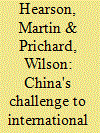| Srl | Item |
| 1 |
ID:
163261


|
|
|
|
|
| Summary/Abstract |
Twentieth century institutions of global economic governance face a profound challenge adapting to the rise of emerging markets and, especially, China's rise. This is especially the case for the international tax regime, whose institutional home is the OECD and which is based on norms that favour capital exporting states. To understand the nature of the challenge posed by China, we focus on the country's engagement with a foundational norm of the international tax regime: the arm's length principle. We show that China's approach to tax cooperation is characterized by a set of apparent contradictions: conciliatory language hides an assault on the arm's length principle; a rhetoric of common cause with developing countries is contradicted by actions that maximize only China's own share of the tax ‘pie’; and a willingness to court the OECD based on the leverage gained from flirtation with outside options. In these respects, China increasingly appears to be using its market power to seek special privileges within international regimes, in ways that mirror the historical actions of the United States
|
|
|
|
|
|
|
|
|
|
|
|
|
|
|
|
| 2 |
ID:
139635


|
|
|
|
|
| Summary/Abstract |
Effective local government taxation is critical to achieving the governance benefits widely attributed to decentralization, but in practice successful tax reform has been rare because of entrenched political resistance. This article offers new insights into the political dynamics of property tax reform through a case study of Sierra Leone, focusing on variation in experiences and outcomes across the country's four largest city councils. Based on this evidence, the article argues that elite resistance has posed a particularly acute barrier to local government tax reform, but that ethnic diversity has sometimes served to strengthen reform by fragmenting elite resistance. Furthermore, opposition councils have had stronger incentives to strengthen tax collection than councils dominated by the ruling party, in order to increase their fiscal autonomy. More generally, heightened electoral competition can lead to sustained revenue gains by encouraging city councils to adopt a more contractual approach to tax reform that stresses transparency, engagement, and equity.
|
|
|
|
|
|
|
|
|
|
|
|
|
|
|
|